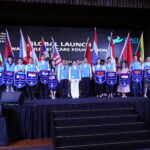This article will discuss how Media and Information Literacy (MIL) empowers individuals. In this context, MIL is used on how it supports human rights. When people are empowered through their fundamental rights, they have the protection against government interference. Hence, this empowerment promotes democratic participation in our information-rich society.
Introduction: Media and Information Literacy supports Human Rights
Through the vast ocean of digital information, Media and Information Literacy (MIL) has become an indispensable skill set. It is essential to learn this subject because people are exposed to a variety of information, and some are harmful.
That is why MIL empowers individuals to critically engage with media sources. Hence, it allows people to make informed decisions. As a result, it allows active participation in societal affairs.
However, what is MIL? This concept encompasses a range of skills essential for effectively accessing, evaluating, and utilizing information:
1. Access and Location of Information: This skill allows individual to get valuable information at credible sources and at the most recent information.
2. Evaluation of Information: This skill assesses the credibility, accuracy, and objectivity of the material shown
3. Creating and Producing Content: These skill set develops another set of skills in producing content
4. Participating in Media: This skill allows engagement with creators and the understanding media systems
Now, why is this concept essential in this modern digital landscape? Since it is easy for people to draw conclusion due to the proximity of information near their fingertips, it is imperative that they can:
· Combat misinformation and disinformation
· Discern credible sources
· Navigate the digital landscape safely and responsibly
MIL as a Fundamental Human Right
International Frameworks
Interestingly, MIL is increasingly recognized as a fundamental human right by international frameworks such as the Universal Declaration of Human Rights and the European Convention on Human Rights. Acknowledging MIL as a human right would realize other interrelated human rights such asL
– The Right to Express Themselves Freely
– The Right to Access of Diverse Sources of Information
– The Freedom to Make Informed Decisions
The Role of MIL in Promoting Democratic Participation
Empowering Citizens
Understand that MIL develops critical thinking skills based on the credible information that people could gain access. When they are informed, the better they participate in society. It also fosters informed participation in democratic processes by:
– Equipping citizens with analytical skills for public discourse
– Enabling critical analysis of media messages
– Enhancing civic engagement and government accountability
Case Studies and Success Stories
Numerous MIL initiatives worldwide have demonstrated the power of these skills in promoting democratic participation. These projects have shown how MIL can:
– Increase overall media literacy
– Promote transparency in governance
– Enhance civic engagement at local and national levels
The Bottomline
Media and Information Literacy is not just a set of skills. It’s also a crucial human right that supports access to information and democratic participation. As we continue to navigate the complex information landscape of the digital age, the promotion of MIL becomes increasingly important.
Call to Action
To ensure that all individuals can engage meaningfully in society, we must:
1. Advocate for continued MIL education and initiatives
2. Encourage collaboration among governments, educational institutions, and civil society
3. Support global efforts to promote MIL and empower individuals
By prioritizing Media and Information Literacy, we can build a more informed, engaged, and democratic society for all.





